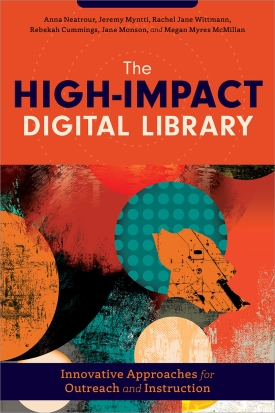Primary tabs
You don't need to be an ALA Member to purchase from the ALA Store, but you'll be asked to create an online account/profile during checkout to proceed. This Web Account is for both Members and non-Members. Note that your ALA Member discount will be applied at the final step of the checkout process.
If you are Tax-Exempt, please verify that your account is currently set up as exempt before placing your order, as our new fulfillment center will need current documentation. Learn how to verify here.
- Description
- Table of Contents
- About the authors
- Reviews
Watch a discussion with one of the coauthors now!
Focusing on replicable outreach success stories, this volume considers the various ways digital library managers and staff can foster relationships with faculty, students, and the broader community to encourage awareness and use of digital library collections.
Digital library terminology like “accessible,” “discoverable,” and “searchable” usually presumes passive collections waiting to be found by motivated information seekers. Rarely do we envision collection managers initiating outreach with those most likely to benefit from the collections. This new collection from Core flips the script, exploring the many ways that digital library practitioners at various types of cultural institutions proactively promote their unique resources. Providing both inspiration and pragmatic guidance to readers as they undertake their own initiatives, this book
- discusses the results of a unique survey that provides new and structured information on digital library outreach and instruction;
- presents outreach case studies illustrating uses of social media promotion, integration of digital collections into teaching and instruction activities, partnerships with external campus units or community organizations, and other activities;
- explores many types of instruction, from drop-in class sessions and training to course-integrated instruction and ways that digital library practitioners can contribute to the Open Educational Resources (OER) and open pedagogy movements;
- details the digital humanities and digital scholarship programs developed at the University of Utah by many of the authors through cross-departmental collaboration;
- describes the ways in which the pandemic spurred many institutions to use rapid response collecting to practice community engagement; and
- speculates on future directions for outreach and instruction for digital libraries
Acknowledgments
Introduction
Chapter 1 Literature Review
Chapter 2 Survey and Interview Findings
Chapter 3 Instruction: Teaching, Training, and Open Pedagogy
Chapter 4 Outreach: Partnerships, Programs, and Projects
Chapter 5 Digital Scholarship and Digital Humanities
Chapter 6 Rapid Response Collecting
Chapter 7 Final Thoughts and Future Directions
Annotated Bibliography of Select Digital Library Projects
Appendixes
Appendix A: Survey Email
Appendix B: Survey
About the Authors
Index
Anna Neatrour
Anna Neatrour, Head of Digital Library Services at the University of Utah, manages programs in Operations, Utah Digital Newspapers, Digital Preservation, and Digital Initiatives and Metadata. She enjoys partnering with faculty and students on digital projects and developing collaborative best practices. She received her MILS from the University of Illinois, Urbana-Champaign.
Jeremy Myntti
Jeremy Myntti, Associate University Librarian for Metadata and IT at Brigham Young University, is responsible for the administration of the library’s cataloging, metadata, archival processing, IT operations, software engineering, and user experience units. He has worked on digital library projects at multiple academic institutions and a library vendor for over 20 years. He received his MLIS from the University of Alabama.
Rachel Jane Wittmann
As the Digital Curation Librarian at the University of Utah, Rachel Jane Wittmann creates metadata for digital collections and develops digital exhibits that document historic and current events in Utah. In addition, Rachel enjoys exploring ways to interpret metadata with data visualizations. She received her MLIS from Pratt Institute’s School of Information.
Rebekah Cummings
Rebekah Cummings is the Digital Matters Interim Director at the University of Utah. In her role, Rebekah coordinates digital scholarship activities between the Marriott Library, College of Humanities, College of Fine Arts, College of Architecture and Planning, and School for Cultural and Social Transformation. Rebekah’s research interests include data management for the arts and humanities, digital humanities, and library advocacy. She received her MLIS from the University of California, Los Angeles.
Jane D. Monson
As the Digital Collections Librarian at the Oregon Historical Society, Jane D. Monson focuses on the development, description, and promotion of the organization’s digital collections. She previously spent 15 years as an academic librarian, coordinating digital library efforts at institutions in Missouri and Colorado. Jane received her MLS from the University of Iowa.
Megan Myres McMillan
Megan Myres McMillan is pursuing a Master of Public Administration at Brigham Young University. She worked on research projects regarding cataloging, IT, and digital libraries at the BYU Library for seven months during her undergraduate education. She received her B.A. in International Relations from BYU.
Core
The former Association for Library Collections and Technical Services (ALCTS), the Library Information Technology Association (LITA), and the Library Leadership and Management Association (LLAMA) are now Core: Leadership, Infrastructure, Futures, a new division of ALA. Its mission is to cultivate and amplify the collective expertise of library workers in core functions through community building, advocacy, and learning.
Have you read this book? Leave a review!



